5 + 22 points
Saucy Tales by penstemøn
July 4th, 2010 8:23 AM / Location: 42.275220,-83.76403
Only the most ancient would be allowed to play. Four stepped forward, confident of their claims.

My fellow judges and I held council on the porch. For generations, La Rousse was the food reference. Nowadays its Francocentric view of the culinary universe seems quaintly laughable, but I still love my copy. As ballast, I used the Penguin Encyclopedia of Food. I have deeply mixed feelings about this one* - the lead editor spent most of his career as British ambassador to Laos writing a cookbook on fish. (He was there from 1973-75. Those of you with historical memory, feel free to weep and/or punch something.)

I started with rosewater, knowing that roses have been cultivated for millenia. But what's this - first used by Persian cooks in the 5th century AD? Are you joking? Sigh. Rosewater's glorious place in Egyptian history was medicinal and cosmetic. I pondered with awe a plant so useful that cooking is actually the very last iteration. Mental note: must plant more roses.
I had planned to save wine vinegar for last, because honestly it's as old as wine itself. But the medicinal/culinary divide had me worried. With good reason, as it turned out. The limey claims the earliest known reference is in Hippocrates, 5th century BC. At this point, I looked up the rosewater entries again because the symmetry of the two dates was so spooky. Almost as if the Game were afoot! The relative age of wine vinegar was hard to swallow. All the peoples of the Mediterranean growing lettuces and mint, pressing olive oil for all they're worth, and wondering what to do with the bit left at the bottom of the wine jars. Surely it is not implausible to think they put it all together.**
By this point I had to fortify myself with a little snack. Both books confirmed the anchovy's ancient pedigree, but I had foolishly forgotten the basic definition of condiment: stuff you don't ever eat by itself. Sorry, anchovies. You are too delicious for this task. Pass me some more snack.
Only one contestant left: shoyu. The oldest version of soy sauce is from China, but I call all soy sauce "shoyu" regardless of national origin. La Rousse, not surprisingly, refuses to acknowledge shoyu's existence. The Brit put the earliest reference at 12th century BC. In your face, wine vinegar!
Back in the kitchen I handed down the ruling. The prize, I explained, was getting to tell us his story. "That's it? That's all?" I left him tut-tutting. Preoccupied with my thoughts, I needed to be alone for awhile to digest my findings. This had really blown my mind.
When I came back later, something fishy was going on. "What the hell is that?" I blurted. Shoyu denied anything out of the ordinary until I pressed. "What the hell do you mean, folding the fabric of time?" I blurted. And cursed the ambASSador's incompetence. He'd dated shoyu based solely on linguistic evidence without considering that words change their meaning. Shoyu as we eat now it can't be dated to much before 16th century AD. I'd walked in on his clumsy attempt at revising history to cover up his fraudulent credentials.

The legitimately ancient contestants aren't stored in the fridge, so the old fraud won anyway (not that I'm bitter). "But that's what I wanted to tell you," he said. "That's my story."
In 1953, the year Elvis made his first records and two years before Emmett Till was murdered, less than half of all Americans had ever eaten pizza. That world is now lost to us. Some of its people live on, but even they can't fathom a universe ordered that way.
Same thing for shoyu: we assume it's how the world has always tasted. Close your eyes, try to imagine centuries of Asian cooking without soy sauce. Most of us would have an easier time imaginging daily life without electricity or safe drinking water. Regardless of whether you yourself enjoy it, the existence of shoyu - the mere fact of it - is fundamental to our worldview.
But obviously there was BS. Before shoyu. And we now realize the BS went on much, much longer than shoyu's era. We are close enough to BP, before pizza, to guess that converting to shoyu happened quickly - not the blink of an eye but perhaps the time it takes to sneeze (on an evolutionary timescale, of course).
Historians and archaeologists tell us that BS was plural. In other words, shoyu replaced a whole family of condiments. There were probably dozens of variations, all made with vegetables, soy, salt, plus either meat or fish. In a time when salt was expensive and rare in the land-locked regions of China, BS was developed to stretch salt. Hardest of all to fathom, BS was chunky, which means food back then not only tasted and smelled different, but it looked different in your bowl and felt different in your mouth.
See what I mean? Gone. Lost. Even if I write you the recipe and we all gather for a BS meal, we would be tasting it for the first time. BS as daily life, commonplace and taken for granted, is utterly irretrievable now.

*It's like Wikipedia - handy starting point, but as reliable as a cable appointment.
**I collect figures of speech. This one is for Lincøln.

My fellow judges and I held council on the porch. For generations, La Rousse was the food reference. Nowadays its Francocentric view of the culinary universe seems quaintly laughable, but I still love my copy. As ballast, I used the Penguin Encyclopedia of Food. I have deeply mixed feelings about this one* - the lead editor spent most of his career as British ambassador to Laos writing a cookbook on fish. (He was there from 1973-75. Those of you with historical memory, feel free to weep and/or punch something.)

I started with rosewater, knowing that roses have been cultivated for millenia. But what's this - first used by Persian cooks in the 5th century AD? Are you joking? Sigh. Rosewater's glorious place in Egyptian history was medicinal and cosmetic. I pondered with awe a plant so useful that cooking is actually the very last iteration. Mental note: must plant more roses.
I had planned to save wine vinegar for last, because honestly it's as old as wine itself. But the medicinal/culinary divide had me worried. With good reason, as it turned out. The limey claims the earliest known reference is in Hippocrates, 5th century BC. At this point, I looked up the rosewater entries again because the symmetry of the two dates was so spooky. Almost as if the Game were afoot! The relative age of wine vinegar was hard to swallow. All the peoples of the Mediterranean growing lettuces and mint, pressing olive oil for all they're worth, and wondering what to do with the bit left at the bottom of the wine jars. Surely it is not implausible to think they put it all together.**
By this point I had to fortify myself with a little snack. Both books confirmed the anchovy's ancient pedigree, but I had foolishly forgotten the basic definition of condiment: stuff you don't ever eat by itself. Sorry, anchovies. You are too delicious for this task. Pass me some more snack.
Only one contestant left: shoyu. The oldest version of soy sauce is from China, but I call all soy sauce "shoyu" regardless of national origin. La Rousse, not surprisingly, refuses to acknowledge shoyu's existence. The Brit put the earliest reference at 12th century BC. In your face, wine vinegar!
Back in the kitchen I handed down the ruling. The prize, I explained, was getting to tell us his story. "That's it? That's all?" I left him tut-tutting. Preoccupied with my thoughts, I needed to be alone for awhile to digest my findings. This had really blown my mind.
When I came back later, something fishy was going on. "What the hell is that?" I blurted. Shoyu denied anything out of the ordinary until I pressed. "What the hell do you mean, folding the fabric of time?" I blurted. And cursed the ambASSador's incompetence. He'd dated shoyu based solely on linguistic evidence without considering that words change their meaning. Shoyu as we eat now it can't be dated to much before 16th century AD. I'd walked in on his clumsy attempt at revising history to cover up his fraudulent credentials.

The legitimately ancient contestants aren't stored in the fridge, so the old fraud won anyway (not that I'm bitter). "But that's what I wanted to tell you," he said. "That's my story."
In 1953, the year Elvis made his first records and two years before Emmett Till was murdered, less than half of all Americans had ever eaten pizza. That world is now lost to us. Some of its people live on, but even they can't fathom a universe ordered that way.
Same thing for shoyu: we assume it's how the world has always tasted. Close your eyes, try to imagine centuries of Asian cooking without soy sauce. Most of us would have an easier time imaginging daily life without electricity or safe drinking water. Regardless of whether you yourself enjoy it, the existence of shoyu - the mere fact of it - is fundamental to our worldview.
But obviously there was BS. Before shoyu. And we now realize the BS went on much, much longer than shoyu's era. We are close enough to BP, before pizza, to guess that converting to shoyu happened quickly - not the blink of an eye but perhaps the time it takes to sneeze (on an evolutionary timescale, of course).
Historians and archaeologists tell us that BS was plural. In other words, shoyu replaced a whole family of condiments. There were probably dozens of variations, all made with vegetables, soy, salt, plus either meat or fish. In a time when salt was expensive and rare in the land-locked regions of China, BS was developed to stretch salt. Hardest of all to fathom, BS was chunky, which means food back then not only tasted and smelled different, but it looked different in your bowl and felt different in your mouth.
See what I mean? Gone. Lost. Even if I write you the recipe and we all gather for a BS meal, we would be tasting it for the first time. BS as daily life, commonplace and taken for granted, is utterly irretrievable now.

*It's like Wikipedia - handy starting point, but as reliable as a cable appointment.
**I collect figures of speech. This one is for Lincøln.






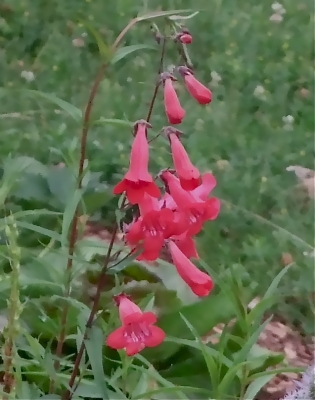







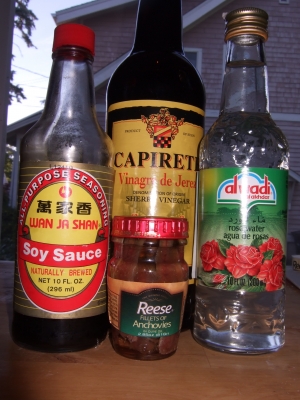
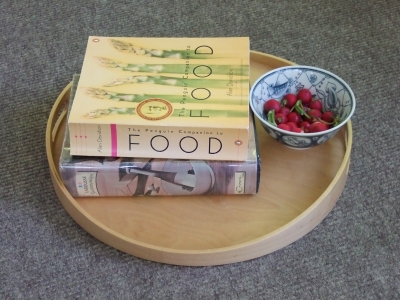
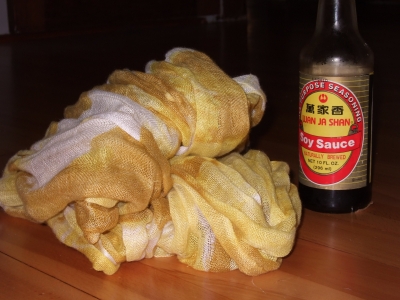
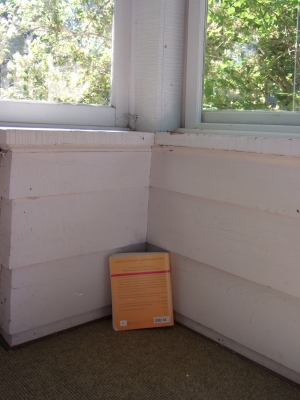
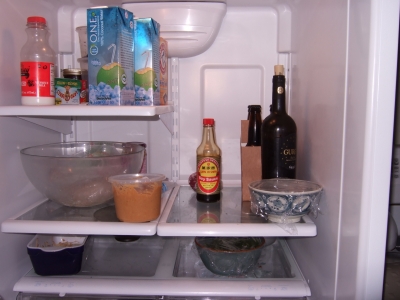
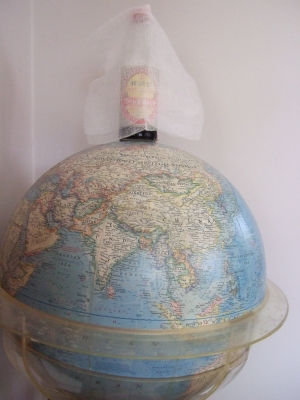






that was an entertaining read